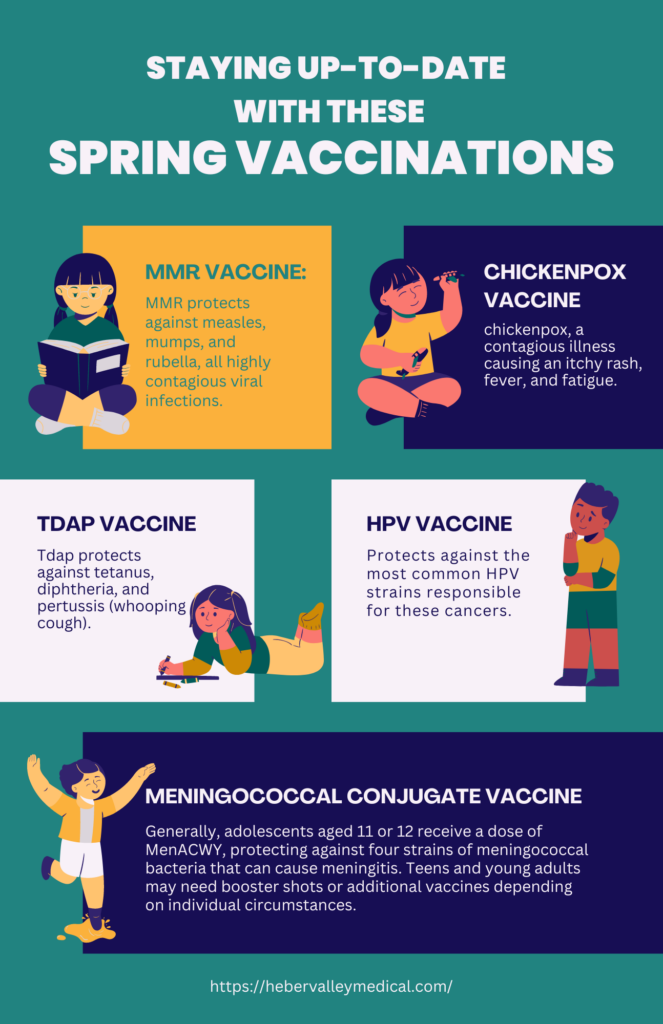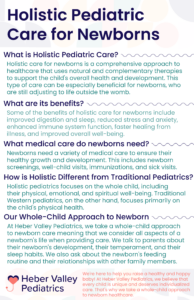Spring is in the air, and with it comes blooming flowers, warmer weather, and…vaccination season! Here at Heber Valley Pediatrics, we understand that keeping track of your child’s immunization schedule can feel overwhelming. However, staying up-to-date on vaccinations as part of your child’s pediatric care is crucial for protecting your child from serious illnesses. This blog post is your one-stop guide to the essential spring vaccinations for children of all ages. We’ll cover the specific vaccines recommended, their benefits, and why spring is an ideal time to schedule your child’s check-up and vaccinations.
Why Vaccinations Matter
Vaccines are one of the most effective tools we have to prevent infectious diseases. They work by introducing a weakened or inactive form of a virus or bacteria to the body. This triggers the immune system to develop antibodies, which are proteins that fight off infection. When your child encounters a real disease in the future, their body is already prepared to combat it, significantly reducing their risk of getting sick.
Vaccines not only protect individual children but also contribute to herd immunity. Herd immunity occurs when a large enough portion of the population is vaccinated, making it difficult for the disease to spread. This protects those who cannot be vaccinated due to medical conditions or young age.
Spring: A Time for Vaccinations
Spring offers several advantages for scheduling your child’s vaccinations:
Reduced Risk of Illness:
With winter colds and flu on the wane, spring allows for the integration of vaccinations in your child’s pediatric care without potential interactions with existing illnesses.
Outdoor Activities:
As the weather warms up, children spend more time outdoors, increasing their exposure to germs. Spring vaccinations ensure they’re protected before the peak of outdoor activities.
Back-to-School Preparations:
Many schools require specific vaccinations for enrollment. Scheduling appointments in the spring helps avoid last-minute rushes before the new school year.
Spring Vaccinations Every Child Should Get

Now that we’ve established the importance of spring vaccinations, let’s delve into the specific ones recommended for different age groups:
1. Measles, Mumps, and Rubella (MMR) Vaccine
- Who Needs It: All children should receive two doses of the MMR vaccine: the first between 12 and 15 months of age, and the second between 4 and 6 years of age.
- What It Protects Against: Measles, mumps, and rubella are all highly contagious viral infections. Measles can cause fever, rash, cough, and even pneumonia. Mumps results in swelling of the salivary glands, fever, and headache. Rubella, also known as German measles, typically causes a mild rash, fever, and headache, but can be particularly dangerous for pregnant women, potentially leading to birth defects in their babies. Pediatric care starts way before birth, it starts with you.
- Why Spring is Ideal: Spring vaccinations ensure your child is protected before the summer months when travel and social gatherings increase the risk of exposure.
2. Varicella (Chickenpox) Vaccine
- Who Needs It: All children should receive two doses of the varicella vaccine: the first between 12 and 15 months of age, and the second between 4 and 6 years of age.
- What It Protects Against: Chickenpox is a highly contagious illness that causes an itchy, blistering rash, fever, and fatigue. While it’s usually a mild illness for healthy children, it can lead to serious complications like pneumonia and encephalitis (inflammation of the brain).
- Why Spring is Ideal: Similar to MMR, spring vaccinations ensure protection before the increased social interactions during summer.
3. Tetanus, Diphtheria, and Pertussis (Tdap) Vaccine
- Who Needs It: All children should receive a dose of the Tdap vaccine between 11 and 12 years of age, followed by booster shots every 10 years throughout adulthood.
- What It Protects Against: Tdap is a combination vaccine that protects against tetanus, diphtheria, and pertussis (whooping cough). Tetanus causes painful muscle contractions, especially in the jaw (lockjaw). Diphtheria is a serious respiratory illness that can lead to difficulty breathing, heart failure, and paralysis. Pertussis is a highly contagious respiratory illness that can cause severe coughing spells, vomiting, and difficulty breathing, especially in infants. To help prevent these illnesses, reach out to your pediatric care specialist.
- Why Spring is Ideal: Spring vaccinations provide a timely opportunity to ensure protection before the back-to-school season, when the risk of exposure to these diseases increases.
4. Human Papillomavirus (HPV) Vaccine
- Who Needs It: The HPV vaccine is recommended for both girls and boys at the age of 11 or 12 years old. It can also be administered up to age 26 for those who weren’t vaccinated earlier.
- What It Protects Against: HPV is a very common sexually transmitted infection. Certain strains of HPV can lead to cervical cancer, vaginal cancer, vulvar cancer, anal cancer, and some head and neck cancers. The HPV vaccine protects against the most common HPV strains responsible for these cancers and genital warts.
- Why Spring is Ideal: Vaccinating preteens before they become sexually active offers the most significant protection against HPV-related cancers. Spring vaccinations ensure they’re protected as they enter adolescence.
5. Meningococcal Conjugate Vaccine
- Who Needs It: There are different types of meningococcal conjugate vaccines available, and the recommended schedule may vary depending on your child’s age and risk factors. Always speak to a physician who specializes in pediatric care Here’s a general breakdown:
- All adolescents aged 11 or 12 years should receive a dose of meningococcal conjugate vaccine (MenACWY). This vaccine protects against four strains of meningococcal bacteria that can cause meningitis, a serious infection of the lining of the brain and spinal cord.
- Teens and young adults aged 16-21 years old who haven’t been previously vaccinated may need a booster dose of MenACWY, especially if they’ll be attending college dorms or traveling to countries with a high risk of meningococcal disease.
- Teens and young adults who have certain medical conditions or compromised immune systems may need additional meningococcal vaccines to protect against specific strains.
- What It Protects Against: Meningococcal meningitis is a rare but potentially life-threatening illness. Symptoms can include fever, headache, stiff neck, nausea, vomiting, and confusion. Early diagnosis and treatment are crucial to prevent serious complications like brain damage, hearing loss, and learning disabilities.
- Why Spring is Ideal: Spring vaccinations provide protection before the start of summer travel and crowded living situations like college dorms, where the risk of exposure to meningococcal bacteria may be higher.
Additional Considerations
Catch-Up Vaccinations:
If your child is behind on their recommended vaccinations, spring is an excellent time to get them caught up on your pediatric care. Our team at Heber Valley Pediatrics can review your child’s immunization records and create a personalized plan to ensure they receive all the necessary vaccinations.
Talk to Your Pediatrician:
This blog post provides a general overview of spring vaccinations, but it is not a substitute for personalized medical advice. We encourage you to schedule a spring check-up with your child’s pediatrician at Heber Valley Pediatrics. During the appointment, we can discuss your child’s specific needs, address any questions you may have, and recommend the most appropriate vaccinations for their age and health history.
Keeping Your Child Healthy
At Heber Valley Pediatrics, we are committed to providing comprehensive and compassionate care for children of all ages. We understand that vaccinations are an essential part of keeping your child healthy and protected from preventable diseases. By scheduling spring vaccinations, you can ensure your child is ready to enjoy the warmer weather and all the fun activities spring has to offer with peace of mind. Contact Heber Valley Pediatrics today to schedule your child’s spring check-up and vaccinations. We look forward to partnering with you to ensure your child’s optimal health and well-being.





